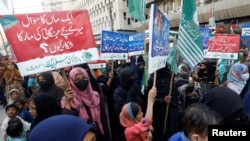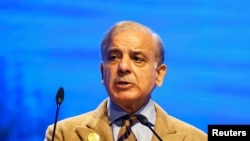Pakistan Prime Minister Shehbaz Sharif has asked his ministers and advisers to fly economy class, forgo luxury cars and their salaries as part of an austerity drive that will save the government $766 million a year.
The belt tightening comes as Islamabad — which is facing a balance of payment crisis — thrashes out a deal with the International Monetary Fund (IMF) to secure funds worth $1 billion which have been pending since late last year over policy issues.
Pakistan's foreign exchange reserves have fallen below a three-week import cover and the expenditure cuts announced on Wednesday are part of an effort to stave off an economic meltdown.
"These austerity measures will save us 200 billion rupees annually," Sharif told a news conference in Islamabad.
"These measures are need of the hour, and these savings no matter if that's one penny is very significant," he said, terming it a sacrifice for the poor who wouldn't afford food on the table or medicines in the face of consistently high inflation, which touched 27.5% in January.
Sharif said all federal ministries and government offices have been directed to reduce expenditure by 15% and that he had asked his ministers and advisers to forgo salaries, allowances, luxury cars, foreign trips and business class travel.
The ministers agreed to the measures voluntarily, he said, adding all Cabinet members will surrender their salaries and perks, and they will pay all of their utility bills from their pockets.
Armed forces have given a positive response to cut non-combat expenditures, Sharif said without elaborating.
Other steps include a complete ban on the purchase of luxury items or vehicles for all government-run entities and no administrative unit like a new district or town will be created for two years.
All luxury vehicles will be withdrawn from the ministers, advisers and bureaucrats, who would travel abroad only if inevitable and that too in economy class.
The South Asian nation hopes to secure funds from the IMF soon, Sharif said, adding the stringent measures were part of the requirements the lender had asked Pakistan to fulfill before finalizing a deal.
Talks between Pakistan and the IMF are due to conclude this week, officials say.
Before the talks the IMF had asked Pakistan to take a host of prior actions, which included withdrawal of subsidies, hiking energy tariffs, raising extra revenues and arranging external financing.







